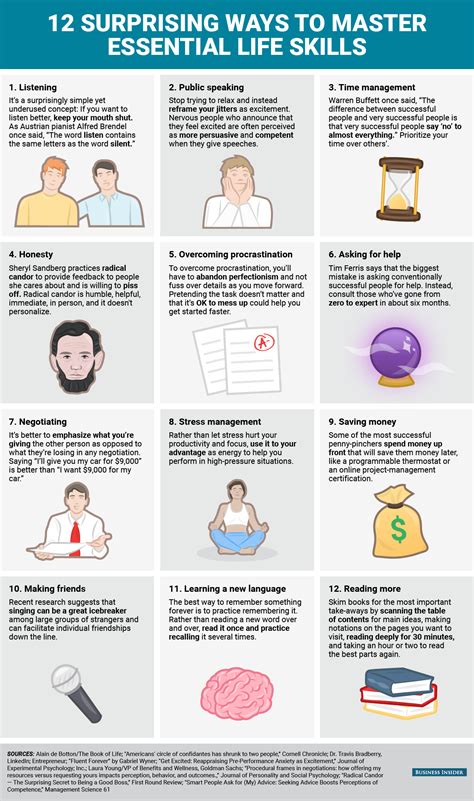Reaching the age of 30 can be a significant milestone in one's life. It's a time when many people reflect on their accomplishments, goals, and overall well-being. Mastering essential life skills can make a huge difference in achieving success and happiness. In this article, we'll explore 30 vital life skills to master by 30.

Financial Literacy
Understanding how to manage finances is crucial for independence and security. By 30, it's essential to have a grasp on:
- Budgeting: Create a budget that accounts for income, expenses, savings, and debt.
- Saving: Develop a habit of saving for short-term and long-term goals.
- Investing: Understand the basics of investing and start building a portfolio.
- Debt management: Learn how to manage debt effectively and pay off high-interest loans.
Communication and Relationships
Effective communication and relationships are vital for personal and professional growth. By 30, aim to master:
- Active listening: Develop the ability to listen attentively and respond thoughtfully.
- Conflict resolution: Learn how to resolve conflicts in a constructive and respectful manner.
- Public speaking: Improve public speaking skills to convey ideas and opinions confidently.
- Networking: Build a professional network and learn how to nurture relationships.
Time Management and Productivity
Time management and productivity are essential for achieving goals and reducing stress. By 30, focus on:
- Prioritization: Learn how to prioritize tasks and focus on high-impact activities.
- Goal setting: Develop a system for setting and achieving short-term and long-term goals.
- Time blocking: Use time blocking to schedule tasks and minimize distractions.
- Productivity tools: Explore different productivity tools and find what works best for you.
Personal Growth and Well-being
Taking care of physical and mental health is crucial for overall well-being. By 30, aim to:
- Exercise regularly: Develop a consistent exercise routine to maintain physical health.
- Meditate and practice mindfulness: Learn how to meditate and practice mindfulness to reduce stress.
- Cooking and meal planning: Develop basic cooking skills and plan healthy meals.
- Sleep habits: Establish healthy sleep habits to improve physical and mental health.
Career Development
Career development is essential for professional growth and job satisfaction. By 30, focus on:
- Career goals: Define career goals and create a plan to achieve them.
- Skill development: Continuously develop new skills to stay competitive in the job market.
- Networking: Build a professional network and attend industry events.
- Personal branding: Develop a personal brand and create a strong online presence.
Home and Organization
Maintaining a clean and organized home is essential for reducing stress and increasing productivity. By 30, aim to:
- Declutter regularly: Develop a habit of decluttering and minimizing possessions.
- Household management: Learn how to manage household tasks and chores.
- Meal planning and grocery shopping: Plan healthy meals and shop for groceries efficiently.
- Time management for household tasks: Use time blocking to schedule household tasks.
Travel and Exploration
Traveling and exploring new places can broaden one's perspective and improve mental health. By 30, aim to:
- Travel regularly: Develop a habit of traveling and exploring new places.
- Cultural immersion: Learn how to immerse yourself in different cultures.
- Budgeting for travel: Develop a budget for travel and plan trips accordingly.
- Travel safety: Learn how to stay safe while traveling.
Learning and Personal Development
Continuous learning and personal development are essential for growth and success. By 30, focus on:
- Reading regularly: Develop a habit of reading and learning new things.
- Learning new skills: Continuously develop new skills to stay competitive and improve personal growth.






Frequently Asked Questions
Why are life skills important?
+Life skills are essential for achieving success and happiness. They help individuals manage their finances, build strong relationships, and maintain good physical and mental health.
How can I improve my life skills?
+Improving life skills requires practice, patience, and persistence. Start by identifying areas for improvement and developing a plan to work on those skills. Seek out resources, such as books, online courses, and workshops, to help you learn and grow.
What are some essential life skills to master by 30?
+Some essential life skills to master by 30 include financial literacy, communication and relationships, time management and productivity, personal growth and well-being, career development, home and organization, travel and exploration, and learning and personal development.
In conclusion, mastering essential life skills is crucial for achieving success and happiness. By focusing on the 30 life skills outlined in this article, individuals can improve their financial literacy, communication and relationships, time management and productivity, and overall well-being. Remember, developing life skills takes time and practice, but the rewards are well worth the effort.
